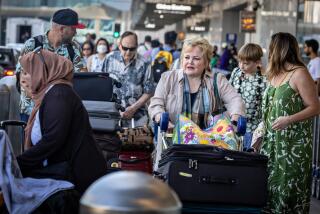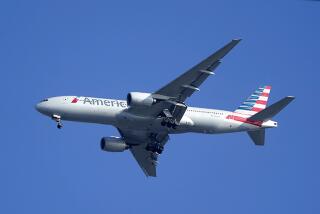Growing passenger fee revenue helps boost airline profits
Profits for the nation’s largest airlines are on the rise thanks to lower fuel prices, steady demand and growing revenue from passenger fees, according to a government report.
From April to June, the profit margin for the nation’s nine largest airlines rose to 6% from 5.3% in the same period in 2011, according to a report Tuesday by the U.S. Bureau of Transportation Statistics.
But industry leaders point out that the improved finances won’t offset losses from the first quarter.
For the first half of 2012, the airlines posted a total of $1 billion in losses, said Victoria Day, a spokeswoman for Airline for America, the trade group for the country’s airlines.
Still, she said, the industry’s financial condition began to improve in the second quarter because of strong passenger revenue and “some fuel price relief.”
As a group, the airlines posted a profit of $2.3 billion for the April through June period, with every carrier reporting a profit for the first time in months. Seattle-based Alaska Airlines reported the largest profit margin, 15.8% for the period, according to the report.
The amount that airlines spent on fuel dropped about 4%, according to federal statistics. Meanwhile, the airlines enjoyed an increase in revenue from baggage check fees, up 5% to $932 million, and reservation change fees, up 8% to $661 million, according to the report.
Delta Air Lines led all carriers in baggage fee revenue, with $231 million, followed by United Airlines, with $195 million. Delta also collected the most in reservation change fees, with $201 million, followed by United, with $175 million, according to the report.
Airlines are not required to report separately other fees they collect, such as charges for wireless Internet, food, drinks and seat upgrades.
Ray Neidl, an airline analyst for New York-based Maxim Group, said he is cautiously optimistic about the industry. He expects airlines to report strong numbers for the July though September period.
But Neidl said he worries that geopolitical turmoil, higher fuel prices and a slump in the economy in the next few months could hurt the positive momentum the industry has created.
“Signs of concern are poking out,” he said.
More to Read
Inside the business of entertainment
The Wide Shot brings you news, analysis and insights on everything from streaming wars to production — and what it all means for the future.
You may occasionally receive promotional content from the Los Angeles Times.










